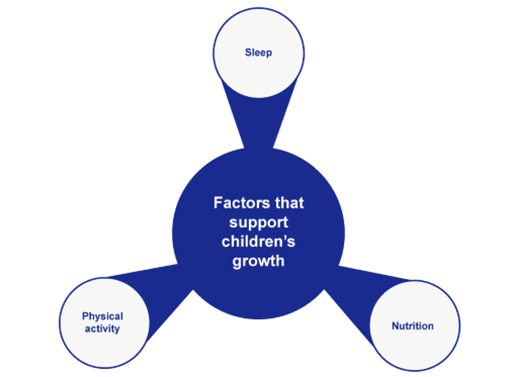1.3 Factors known to have a positive impact on children’s physical growth
Figure 2 shows the factors which have a positive impact on a child’s physical growth.
Sleep
Sleep is vitally important to children’s growth because growth hormone is actually secreted during sleep. Many body movements occur during sleep that contribute to building muscle strength and mobility. Establishing sleep routines is vital and should ideally include no screen time during the two hours before bedtime. Children are more likely to become overweight or obese if they get less than their recommended amount of sleep (Miller et al., 2018).
The pineal gland in the brain regulates the ‘biological’ clock that is connected to the production of melatonin and serotonin and is stimulated by blue light. Being active and outside every day – especially before noon – helps maintain the evening levels of melatonin that really support quality sleep (NHS Great Ormond Street Hospital for Children, 2023).
Nutrition
Nutrition is a vital factor in supporting children’s growth. They need a well-balanced diet that gives them all the nutrients that are essential to promoting bone growth. Calcium is particularly important for bone growth and being regularly outside and active in the sunshine encourages the intake of Vitamin D. Vitamin D supplements are recommended from 6 months onwards.
Physical activity
Physical activity is important to provide children with opportunities to enjoy activities that encourage bone growth. These may include hanging from monkey-bars, pushing and pulling things around, digging holes, building dams, sweeping leaves or puddles, and whole-body movements like rolling, crawling, walking, running, jumping and climbing.
Being active also improves blood flow in the lymphatic system so the immune system may respond quickly to viruses and infections. Moving every day will benefit the growth of healthy tendons and ligaments through increased blood flow. Muscle tissue growth will be stimulated by plenty of physical activity.
Being active outside also supports the manufacture of vitamin D that promotes healthy bone growth. Calcium gained through food and drink is helped by vitamin D to pass from the blood stream into the bone structure.

